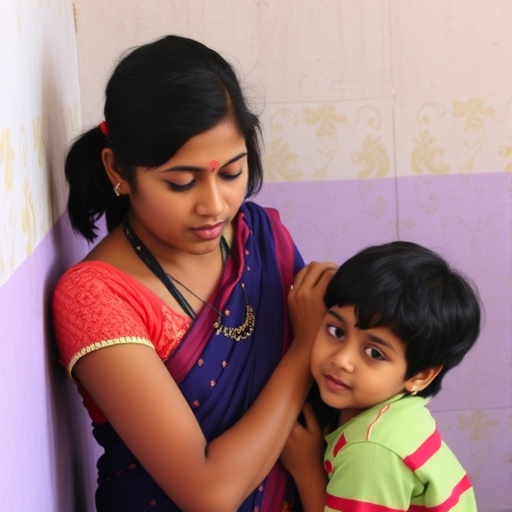In recent years, a growing body of research has begun to elucidate the profound and lasting effects that domestic violence can exert beyond direct physical harm. A groundbreaking study published in PLOS One on May 28, 2025, brings to light the troubling correlation between maternal experiences of domestic violence and the mental health outcomes of their adolescent children in India. This comprehensive investigation, conducted by a diverse group of researchers from six countries—including the U.S., Germany, India, the U.K., France, and China—delves into the psychological ramifications for a population often overlooked in violence prevention discourse: adolescent offspring.
The study focuses explicitly on anxiety and depression among Indian adolescents whose mothers have endured domestic violence. The intricate linkage between maternal trauma and adolescent mental health underscores a critical dimension of psychological vulnerability in youth, shaped by the family environment and intergenerational transmission of stress. Anxiety and depression, two of the most pervasive mental health disorders globally, are here connected explicitly to domestic violence, a form of trauma with widespread prevalence in India, yet frequently shrouded in cultural silence.
Using robust epidemiological techniques and validated psychological assessments, the researchers analyzed data across multiple states, accounting for socio-economic, cultural, and regional variations. This multifaceted approach allowed them to attribute mental health outcomes to maternal experiences of violence while controlling for confounding factors such as poverty, education, and community support. The study leverages advanced statistical modeling, including multivariate regression analyses, to isolate the specific impact of maternal domestic violence on adolescent anxiety and depression levels.
One of the core findings reveals that adolescents with mothers subjected to domestic violence exhibit significantly elevated symptoms of anxiety and depression compared to peers whose mothers have not experienced such trauma. This heightened vulnerability suggests a potent psychosocial mechanism mediated through familial stress, potentially disrupting emotional regulation and cognitive development during critical adolescent years. The biochemical underpinnings potentially involve dysregulation of the hypothalamic-pituitary-adrenal (HPA) axis in both mothers and their children, fostering heightened stress sensitivity and neuroendocrine imbalances that predispose young individuals to mood disorders.
Importantly, the study situates its findings within the broader sociocultural context of India, where domestic violence remains a pervasive issue complicated by traditional gender roles, economic dependency, and limited access to mental health resources. The intersectionality of these factors exacerbates the psychological toll on adolescent children, creating a cycle of adversity that is both deeply personal and socially entrenched. The study thus calls for integrated support systems addressing both maternal trauma and adolescent mental health needs.
The authors underscore the necessity for public health interventions that extend beyond immediate physical safety to encompass the mental health of the entire household unit. Programs focusing solely on the survivor’s physical protection may inadvertently overlook the psychological aftermath endured by children in these domestic environments. Mental health screenings, trauma-informed counseling, and community-based support networks emerge as essential components of a holistic response to domestic violence.
Moreover, this research contributes significantly to the global discourse on intergenerational trauma, providing empirical evidence from a low- and middle-income country setting—a region where such nuanced studies remain scarce. It reinforces the urgency of adopting a life-course perspective in addressing the mental health fallout of domestic violence, emphasizing early intervention during adolescence to prevent chronic psychological morbidity.
Critically, the absence of specific funding for this research highlights the scholarly commitment and collaborative efforts of international experts dedicated to uncovering these pressing public health issues. The declaration of no competing interests further attests to the impartiality and academic rigor underpinning the study.
This study’s methodology involved careful psychometric evaluation of adolescents’ anxiety and depression symptoms, employing standardized scales congruent with DSM-5 criteria. By validating the assessment instruments in local languages and cultural contexts, the research ensures reliability and relevance of findings across diverse Indian subpopulations. Such rigor addresses a common limitation in cross-cultural mental health research, where Western instruments are often misapplied without adaptation.
The implications for policy are profound. Governments and non-governmental organizations can utilize this evidence to advocate for integrated domestic violence and mental health policies, targeting vulnerable populations with a dual focus. Interventions promoting maternal empowerment, social support enhancement, and adolescent psychological resilience are pivotal in mitigating the multifaceted consequences of domestic violence.
Furthermore, this study galvanizes future research agendas aimed at disentangling the biological, psychological, and social pathways through which domestic violence impacts offspring mental health. Longitudinal studies tracking developmental trajectories and intervention outcomes would further deepen understanding and inform effective strategies.
In sum, the research not only sheds light on a critical but neglected public health issue in India but also contributes to global knowledge on how violence within the intimate sphere reverberates through generations. By highlighting the elevated risk for anxiety and depression in adolescents whose mothers have faced domestic violence, this study calls for urgent, multifaceted responses—emphasizing prevention, early detection, and comprehensive care—to break the cycle of trauma and promote mental well-being in vulnerable populations.
Subject of Research: The impact of maternal experiences of domestic violence on adolescent mental health in India, focusing on anxiety and depression.
Article Title: Examining the impact of maternal experiences of domestic violence on the mental health of their adolescent children in India
News Publication Date: 28-May-2025
Web References: http://dx.doi.org/10.1371/journal.pone.0304936
COI Statement: The authors have declared that no competing interests exist.
Keywords: Domestic violence, maternal trauma, adolescent mental health, anxiety, depression, India, intergenerational trauma, public health, psychological outcomes




